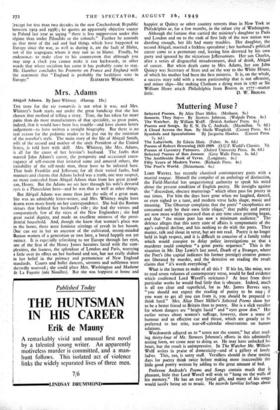Mrs. Adams
Abigail Adams. By Janet Whitney. (Harrap. 15s.) THE taste for the vie romantie is not what it was, and Mrs. Whitney's book starts out under the great handicap that she has chosen that method of telling a story. True, she has taken far more pains than do most manufacturers of that speciality, so great pains, indeed, that it would have been less trouble—and have shown better judgement—to have written a straight biography. But there is no real reason for the pedantic reader to be put out by the imitation of the novelist's style. The main story of the life of Abigail Smith, wife of the second and mother of the sixth President of the United States, is told here with skill. Mrs. Whitney, like Mrs. Adams, is all for the cause of her heroine's husband. The faults that marred John Adams's career, the pomposity and occasional extra- vagance of self-esteem that irritated some and .amused others, the irritability of the self-made man, these have to be inferred here. That both Franklin and Jefferson; for all their varied faults, had manners and charms that Adams lacked was a truth, one may suspect, no more concealed from Abigail Adams than from her great grand- son, Henry. But the Adams we see her through his wife's devoted eyes is a Plutarchian hero—and he was that as well as other things.
But Abigail Adams was more than just the wife of a great man. She was an admirable letter-writer, and Mrs. Whitney might have drawn even more freely on her correspondence. She had the Roman virtues that befitted her husband's role • she had the virtues and comparatively few of the vices of the New Englanders; she had great social dignity, and made an excellent mistress of the presi- dential household. And, though she knew that woman's place was in the home, there were feminist stirrings of revolt in her bosom. One can see in her an ancestor of the cultivated, strong-minded Boston women of a generation or two later, a breed happily not yet extinct. It is especially refreshing to see Europe through her eyes, one of the first of the Henry James heroines faced with the com- plexities, the laxness, the splendour of London and Paris, worrying a little over its effect on her husband and son, but not really shaken in her belief in the primacy and permanence of New England standards. Courts and ballet dancers, servants and noblemen were shrewdly assessed • she could place Mrs. Washington and Madame de La Fayette (nee Noailles). But she was happiest at home and
happier at Quincy or other country retreats than in New York or Philadelphia or, for a few months, in the infant city of Washington. Although the fortune that carried the minister's daughter to Paris and London and on to the rank of first lady of the new nation was dazzling enough, her life had many troubles. Her daughter, the second Abigail, married a feckless speculator ; her husband's political career came to a premature end, leaving him deserted by his own party and ignored by the victorious Jeffersonians. Her son Charles, after a series of disgraceful misadventures, died of drink, Abigail of cancer. But when death came to Mrs. Adams, her son John Quincy was Secretary of State and on the way to the White House, of which his mother had been the first mistress. It is, on the whole, a success story told with a warm partisanship that is not offensive, and minor slips—like making Chatham a dying man in 1767 or Sir William Howe attack Philadelphia from Boston in 1777—matter






























 Previous page
Previous page